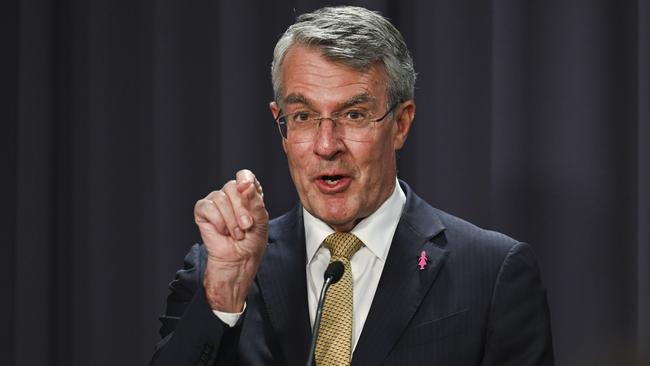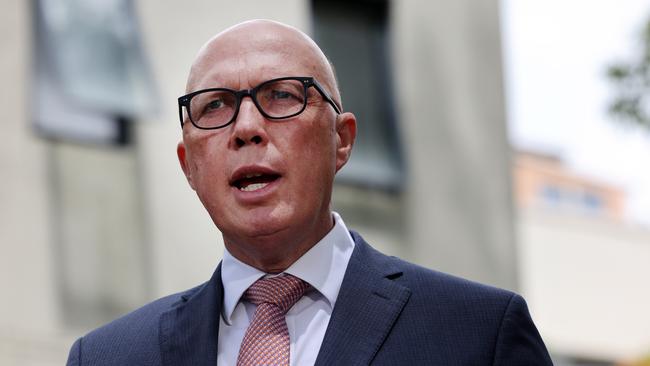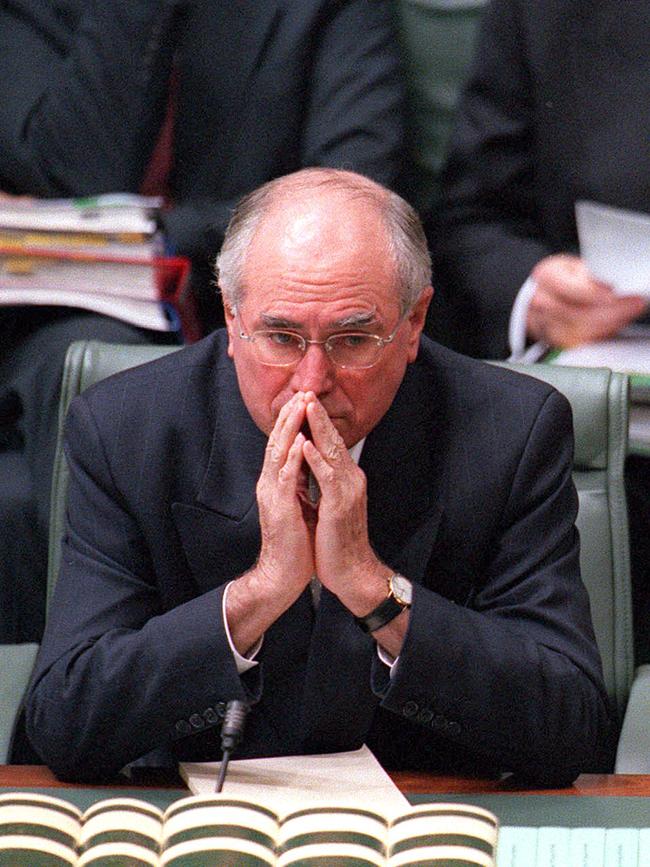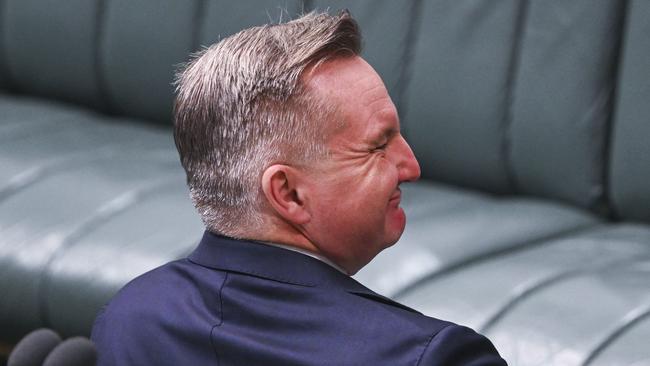Can Labor claw its way back from first-term abyss?
The past two months have been catastrophic for Anthony Albanese and the Labor government. There’s no dispute about that. The real question is whether the damage is permanent.

The real question is whether this damage is permanent and if the Prime Minister and Labor are able to claw their way back from their first-term abyss.
It’s what happens in the next two months that will determine the tone and success – or failure – of the second half of the Albanese government’s term.
For Albanese the challenge is not insurmountable but it is going to take more than just a ministerial reshuffle, a bit of a positive “vibe” after a Christmas summer break with tennis and cricket and a new suit to regain political leadership and momentum.
How Albanese and his colleagues – who have flummoxed and failed their way through the two months since the failure of the Indigenous voice to parliament referendum in October – confront the challenges will not only be a test of leadership but also a necessity for political survival.

The idea that there can be a bit of a reset on policy, a bit of a nip and tuck with a ministerial reshuffle and some sharper politics and Labor will be back on course is a dangerous underestimation of the threat facing the Albanese government going into the new year.
There has been a long line of political miscalculation and mistakes in recent months that have cumulatively undermined public support in Albanese and his government, that did not start with the referendum failure but have snowballed since.
On the economic side the rising cost of living, mortgage rate rises, petrol prices, poor productivity, the slowing national growth revealed this week, a dour global outlook and spiralling energy costs continue to be the main concern for households and businesses with little prospect of the government being able to meaningfully address them in the medium term.
On the political side, the massive loss of the voice referendum, the mixed messages on the Middle East conflict and rise of anti-Semitism domestically, Chinese navy aggression against Australian sailors, the Prime Minister’s extensive overseas travel, rising immigration and the failure to handle the High Court’s order to release almost 150 convicted criminals – including murderers, rapists and child sex offenders – have caused a slump in public support for the government.
Simultaneously, Peter Dutton has exercised superior political and parliamentary judgment that has made him the central political leader at the end of this year, diminishing Albanese’s authority and public support.

Bad first terms are not unusual for governments – indeed, there are more bad starts to first terms than good ones – so Albanese’s experience is not unprecedented and there are examples of how a first-term prime minister recovered an ascendancy after a bad start.
But there are also precedents of leaders who failed or were unable to alter the direction of the government and their own trajectory and lost their job and/or government as a result. When governments go into a spiral of decline and ill-discipline the task of pulling out of that spiral is immense and the price of failure even greater.
In the past 20 years it has proved possible, indeed more likely, for the leader to lose the top job at the hands of nervous government MPs fearful of losing the election and becoming a oncer government than actually losing an election.
As Albanese pointed out last week, if he wins the election, which must be called by April 2025, he will be the first prime minister since John Howard in 2004 to be elected for successive terms.
In 2007 Howard lost the election, in 2010 Kevin Rudd was removed in his first term, in 2013 Julia Gillard was removed in her first elected term, in 2015 Tony Abbott was removed in his first term, in 2018 Malcolm Turnbull was removed in his first elected term and last year Scott Morrison, who won in 2020, lost the election.
For all of these leaders there was a moment of permanent change in popular support that was never regained, a change that was turned around or a decline that fed discontented colleagues who moved against the leader because of fears of losing the next election.
The most graphic historical examples of first-term malaise from which Albanese can learn what to do and what not to do are Howard, who went on to be prime minister for 11 years, and Albanese’s immediate Labor predecessors Rudd and Gillard, who lost their jobs and elections.

In the first example, Howard successfully dealt with a first-term political spiral by going for the grand design, the huge policy idea that, while it may seem unpopular at first, ensures that the public and political debate is about nothing else, and so retrieves the agenda and momentum for the government of the day.
After the Coalition was elected in early 1996 and was hit by several crises, Howard’s standing and that of his government began the same order of decline of Albanese of late: after 18 months in government voter satisfaction with Howard dropped to a low of 31 per cent in Newspoll and the Coalition’s primary vote dropped 10 points from the election to 37 per cent.
Howard’s reaction to this decline in support was to announce a huge policy initiative to take to the 1998 election – a GST.
It seemed like madness and a political death wish, but Howard argued a GST was necessary and he had a majority in the House of Representatives of 45 seats. Albanese has a majority of two.
Howard took on his previous claim that there would never, ever be a GST and that “it’s dead”, and declared he would not do it without an election. In May 1998, Howard said: “I don’t deny using those words. And you will be aware of course that I haven’t tried to introduce a GST or tax reform during our first term in government.
“We have formed the view that tax reform, including possibly a broadbased, indirect tax, or GST, whatever you might want to call it, is desirable for Australia and we are going to the public at the next election and we are laying out our plan and if the public don’t like it, then they will vote against us, and we will fail.”
Howard put his leadership, his neck and the political lives of a large number of his MPs on the line in the name of a huge new policy. At the 1998 election Howard lost half of his majority but won the election and went on to win two more as prime minister.
Howard had gone into the 1996 election with a small target and a string of so-called headland speeches to lay out his broad intentions and convictions. He got elected in 1996 and re-elected in 1998 because he changed from a small target to a big target.
Albanese’s big policies, after running a small-target strategy in 2022, are now mighty unpopular, with Chris Bowen’s renewable energy policy not delivering the promised cuts in power bills and Tony Burke’s industrial relations changes – rammed through on Thursday – alienating the entire business sector.

Rudd’s difficulties also began 18 months into his first term after he failed to deliver on his climate change promises and illegal boat arrivals undermined public faith in Labor. Labor MPs lost faith in Rudd’s leadership and moved against him just over two years into his term.
After Gillard became leader there was a rise in Labor support and, although she lost majority government, Gillard was re-elected as prime minister. But early in her elected term Gillard – and Labor – sustained permanent damage when she broke her pledge not to have a carbon tax and signed a deal with the Greens to bring in such a tax.
As Labor support continued to lag and the 2013 election loomed, Gillard suffered the same fate as Rudd and was removed as leader because, while she had dealt with a series of Rudd-era problems, she could not regain the ascendancy and paid the price.
For Albanese, these are all clear lessons of how to deal with or not deal with a midterm malaise, but his options on a “big idea” seem limited to unpopular policies that are already in a quagmire and he certainly won’t want to create too many enemies going into 2024 with a huge ministerial shuffle.






The past two months have been catastrophic for Anthony Albanese and the Labor government. There’s no dispute about that, it’s obvious, and the evidence is there for all to see despite the bluff and bluster.